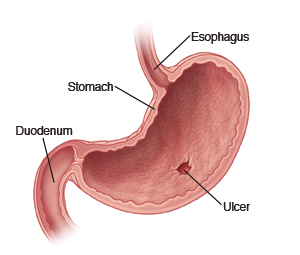Gastritis is irritation and inflammation of the stomach lining. This means the lining is red and swollen. It can cause shallow sores in the stomach lining called erosions. An ulcer is a deeper sore in the lining of the stomach. It may also occur in the first part of the small intestine (duodenum).
The causes and symptoms of gastritis and ulcers are very similar.
Causes and risk factors for both problems can include:
-
Long-term use of nonsteroidal anti-inflammatory drugs (NSAIDs), such as aspirin and ibuprofen
-
H. pylori bacteria infection
-
Tobacco use
-
Alcohol use
-
Certain other conditions, such as immune disorders, certain medicines such as high-dose iron supplements, and street drugs, such as cocaine
Symptoms for both problems can include:
-
Dull or burning pain in the upper part of the belly
-
Loss of appetite
-
Heartburn or upset stomach
-
Frequent burping
-
Bloated feeling
-
Nausea with or without vomiting
You likely had an assessment to help find the exact cause and extent of your problem. This may have included a health history, exam, and certain tests.
Results showed that your problem is not from H. pylori infection you may not need antibiotics as part of your treatment.
Whether your problem is gastritis or an ulcer, you will still need to take other medicines. You will also need to follow instructions to help reduce stomach irritation so your stomach can heal. Your healthcare provider may advise you to quit smoking and to stop drinking alcohol If certain medicineshealthcare provider
Home care
-
Take any medicines you’re prescribed exactly as directed. Common medicines used to treat gastritis include:
-
Antacids. These help neutralize the normal acids in your stomach.
-
H2 blockers. These reduce the amount of acid your stomach makes.
-
Proton pump inhibitors. These decrease your stomach acid more effectively than H2 blockers.
-
Bismuth subsalicylate. This helps protect the lining of your stomach from acid.
-
-
Don't take any NSAIDs during your treatment. If you take NSAID to help treat other health problems, tell your healthcare provider. They may need to adjust your medicine plan or change the dosage.
-
Don’t use tobacco and don’t drink alcohol. These products can increase the amount of acid your stomach makes. This can delay healing. It can also make symptoms worse.
-
Consume plenty of fruits and vegetables and other sources of dietary fiber.
Follow-up care
Follow up with your healthcare provider, or as advised. In some cases, you may need more tests.
When to get medical advice
Call your healthcare provider right away if any of these occur:
-
Fever of 100.4°F (38°C) or higher, or as directed by your healthcare provider
-
Stomach pain that gets worse or moves to the lower right part of belly or towards the back
-
Extreme tiredness (fatigue)
-
Weakness or dizziness
-
Continued weight loss
-
Frequent vomiting, blood in your vomit, or coffee ground like substance in your vomit
-
Black, tarry, or bloody stools
-
Symptoms get worse or you have new symptoms
Call 911
Call
-
Chest pain appears or gets worse, or spreads to the back, neck, shoulder, or arm
-
Unusually fast heart rate
-
Trouble breathing or swallowing
-
Confusion
-
Extreme drowsiness or trouble waking up
-
Fainting
-
Large amounts of blood present in vomit or stool


